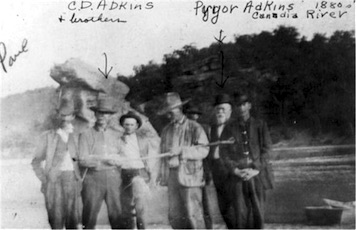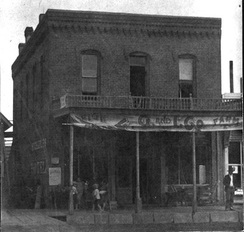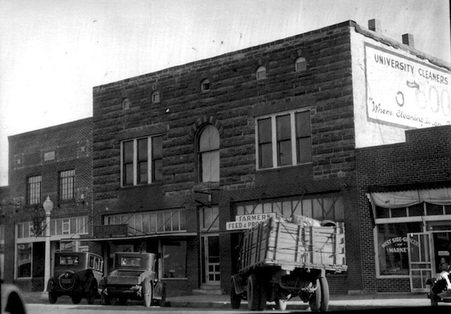The isolated highway stretches through the countryside east of the freeway into McClain County, where it angles southeast up an incline onto a hill that looks north over the South Canadian River and into Norman. Very few people, who travel Adkins Hill Road in the old Chickasaw Nation, are aware of Pryor V. Adkins or his significance to the economic development of Norman, Oklahoma after settlement in 1889.
Pryor V. Adkins was born in Tennessee in 1841. He first married in 1859 to Phariba Jane Hughett in Scotts County, Tennessee. At the onset of the Civil War in 1861, Adkins joined the 2nd Regiment Tennessee Infantry; the Regiment fought for the Union cause. After the War, Phariba and Adkins divorced. In 1865, Pryor Adkins married Elizabeth Byrd in Tennessee. They settled down and started a family; eventually raising six sons, four would live to adulthood. In 1880, Adkins moved his family westward in search of economic opportunities. They settled in Sebastian County Arkansas, with five boys ranging in age 4 to 14. At the time, son, Columbus D. (C.D.) Adkins, was 12 years old.
Somewhere between Sebastian County, Arkansas, which abutted Indian Territory and the Choctaw lands to the west, young C.D. met Sarah Jane McKinney, who was ¼ Choctaw. On January 25, 1886, C.D. and Sarah were married at Sans Bois, Indian Territory. Soon afterward, Pryor Adkins once again moved his family westward. In the spring of 1886, the Adkins family camped in the vicinity of Norman. The most likely camping place was “Norman’s Camp,” a spring on Bishop’s Creek where surveyor, Abner Norman camped in 1873, and where Montford T. Johnson’s cowboys camped while guarding Johnson’s livestock on the Arbuckle Trail. (The spring/camp was located near the intersection of Lindsay and Porter.)
The Adkins family ultimately located south of the South Canadian River in the Chickasaw Nation in 1886. C.D. Adkins marriage to a woman with Choctaw linage qualified the family to lease land from the Chickasaws. According to the Adkins family history, the land was ”beautiful indeed with acres of wild flowers, vast forests and pasture land for miles and miles, where wild animals roamed. This was the paradise they sought.” Regardless of the somewhat overrated attributes contributed to the land south of the Canadian River, Adkins took advantage of the natural resources available to him; He and his boys cut and bailed prairie grass on land that is now Norman. Through their lease with the Chickasaw Nation, the family acquired several thousand acres of grazing land, and built a log home on the hill in the middle of their new “paradise.” Below their Hill on the South Canadian, Adkins and his boys established a ferry business; the area was known for years as Adkins’ crossing. Eventually, the first bridge built across the river was at this crossing. (24th Ave. SW). The family also established a corn meal mill and a lumber mill at the bottom of the hill.
Along with his various enterprises south of the Canadian River, Adkins was one of the first to move ahead with establishing substantial businesses in Norman. Shortly after the run, Adkins built the Planters Hotel on his town lot just east of the Santa Fe track, north side, 101 East Main.
He called the first meeting in order to establish a charter and elect city officials. Those interested met in Edwards Park, now renamed James Garner Plaza. Townsite member Thomas Waggoner was elected mayor and Adkins was elected clerk and recorder. In 1894, Adkins was elected Mayor.
Pryor Adkins was typical of those who saw the economic benefits on the western frontier. The settlement of the America West began in earnest after the United States congress passed the Homestead Act in 1862. Opening Native America lands for settlement in what is now Oklahoma was one of the last opportunities for free land and a new beginning. Adkins, like many who sought economic advancement, had to realize there would be many such opportunities in the new Territory of Oklahoma. Being blessed with a family of boys, who could help establish a ranch and other economic enterprises needed in a new settlement, Adkins provided a foundation for his sons and their families, all contributed to financial success of the City of Norman that we know today.



 RSS Feed
RSS Feed